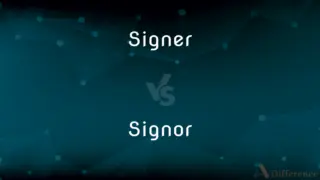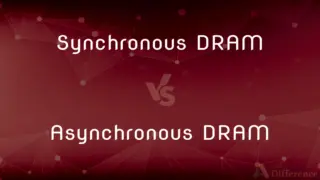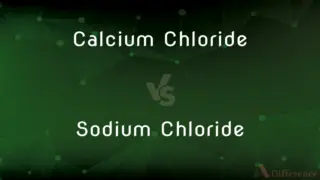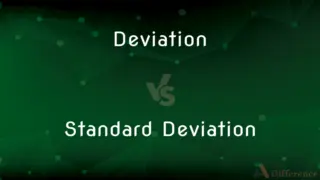Has vs. As — What's the Difference?
By Fiza Rafique & Urooj Arif — Updated on March 26, 2024
"Has" is a verb denoting possession or presence, e.g., "She has a car." "As," a conjunction or preposition, compares or connects, e.g., "As a teacher, he's great."

Difference Between Has and As
Table of Contents
ADVERTISEMENT
Key Differences
"Has" is the third person singular present tense form of "have," indicating possession, relationships, or characteristics. It is used with singular subjects like "he," "she," or "it." For example, "She has a new book." Whereas "as" serves as a conjunction or preposition, denoting comparisons, roles, or functions. It's used in contexts like "As a writer, she excels."
While "has" primarily functions within the verb phrase of a sentence, contributing to the main verb's tense or aspect, as in "The company has expanded rapidly," "as" can introduce clauses or phrases that compare, illustrate, or explain, such as "As seen in the example, growth is evident."
"Has" is crucial for constructing perfect tenses in English, indicating completed actions or experiences up to a point in time, e.g., "He has finished his work." While "as" might introduce similes or conditions, e.g., "Quick as a fox."
"Has" also appears in idiomatic expressions implying necessity or requirement, for instance, "has to go," signifying an obligation. Conversely, "as" can imply timing or manner, showing how actions are performed, e.g., "As previously stated, we will proceed."
Understanding the difference between "has" and "as" is essential for correct English usage. "Has" specifies ownership or existence, while "as" relates terms in comparative or contextual manners.
ADVERTISEMENT
Comparison Chart
Part of Speech
Verb
Conjunction/Preposition
Function
Indicates possession, relationship, or characteristic
Introduces comparisons, roles, or functions
Example Usage
"She has a cat."
"As a leader, he inspires."
Tense
Present tense, third person singular form of "have"
Not applicable
Common Contexts
To describe ownership, experiences, or qualities
To compare, show roles, or explain conditions
Compare with Definitions
Has
Forms perfect tenses.
He has completed the project.
As
Compares similarity.
Smart as he is, he made mistakes.
Has
Describes relationships.
She has three sisters.
As
Introduces roles or identities.
As a mentor, she excels.
Has
Implies necessity or obligation.
She has to attend the meeting.
As
Indicates manner.
Do as I say, not as I do.
Has
Indicates possession.
He has a strong work ethic.
As
Specifies time.
As the day ended, they celebrated.
Has
Shows characteristics.
This plan has potential.
As
Introduces conditions.
As long as you agree, we can proceed.
Has
Third person singular present tense of have.
As
Used in comparisons to refer to the extent or degree of something
Go as fast as you can
It tasted like grape juice but not as sweet
As
Used to indicate that something happens during the time when something else is taking place
Frank watched him as he ambled through the crowd
As she grew older, she kept more to herself
As
Used to indicate by comparison the way that something happens or is done
They can do as they wish
She kissed him goodbye, as usual
As
Because; since
I must stop now as I have to go out
As
Even though
Try as he might, he failed to pull it off
Sweet as he is, he doesn't pay his bills
As
Used to refer to the function or character that someone or something has
She got a job as a cook
It came as a shock
As
During the time of being (the thing specified)
He had often been ill as a child
As
An ancient Roman copper coin.
As
To the same extent or degree; equally
The child sang as sweetly as a nightingale.
As
For instance
Large mammals, as the bear or lion.
As
When taken into consideration in a specified relation or form
This definition as distinguished from the second one.
As
To the same degree or quantity that. Often used as a correlative after so or as
You are as sweet as sugar. The situation is not so bad as you suggest.
As
In the same manner or way that
Think as I think.
As
At the same time that; while
Slipped on the ice as I ran home.
As
For the reason that; because
Went to bed early, as I was exhausted.
As
With the result that
He was so foolish as to lie.
As
Though
Great as the author was, he proved a bad model. Ridiculous as it seems, the tale is true.
As
In accordance with which or with the way in which
The hotel is quite comfortable as such establishments go. The sun is hot, as everyone knows.
As
(Informal) That
I don't know as I can answer your question.
As
In the role, capacity, or function of
Acting as a mediator.
As
In a manner similar to; the same as
On this issue they thought as one.
As
An ancient Roman coin of copper or copper alloy.
As
An ancient Roman unit of weight equal to about one troy pound.
As
To such an extent or degree; to the same extent or degree.
You’re not as tall as I am.
It's not as well made, but it's twice as expensive.
As
Considered to be, in relation to something else; in the relation (specified).
As
(dated) For example; for instance. such as.}}
As
; very much; extremely
Sweet as
As
In the (same) way or manner that; to the (same) degree that.
Do as I say!
I'm under a lot of pressure, as you know.
As you wish, my lord!
The kidnappers released him as agreed.
As
So or as to introduce a comparison.}}
She's twice as strong as I was two years ago.
It's not so complicated as I expected.
As
With the result that it is.
As
Though.
As
At the time that; during the time when:
As
At the same instant or moment that: when.
As I came in, she fled.
As
At the same time that, during the same time when: while.
He sleeps as the rain falls.
As
Varying through time in the same proportion that.
As my fear grew, so did my legs become heavy.
As she grew older, she grew wiser.
As
Being that, considering that, because, since.
As it’s too late, I quit.
As
(dated) Introducing a comparison with a hypothetical state (+ subjunctive, or with the verb elided): as though, as if.
As
(law) used before a preposition to clarify that the prepositional phrase restricts the meaning of the sentence; specifically.
As
That, which, who. See usage notes.
He had the same problem as she did getting the lock open.
As
Than.
As
In the role of.
What is your opinion as a parent?
He was never seen as the boss, but rather as a friend.
As
By way of
I bought you a new toy as a special treat.
As
(unit of weight) A libra.
As
Any of several coins of Rome, coined in bronze or later copper; or the equivalent value.
As
(rare) a's.
As
Denoting equality or likeness in kind, degree, or manner; like; similar to; in the same manner with or in which; in accordance with; in proportion to; to the extent or degree in which or to which; equally; no less than; as, ye shall be as gods, knowing good and evil; you will reap as you sow; do as you are bidden.
His spiritual attendants adjured him, as he loved his soul, to emancipate his brethren.
As
In the idea, character, or condition of, - limiting the view to certain attributes or relations; as, virtue considered as virtue; this actor will appear as Hamlet.
The beggar is greater as a man, than is the man merely as a king.
As
While; during or at the same time that; when; as, he trembled as he spoke.
As I return I will fetch off these justices.
As
Because; since; it being the case that.
As the population of Scotland had been generally trained to arms . . . they were not indifferently prepared.
As
Expressing concession. (Often approaching though in meaning).
We wish, however, to avail ourselves of the interest, transient as it may be, which this work has excited.
As
That, introducing or expressing a result or consequence, after the correlatives so and such.
I can place thee in such abject state, as help shall never find thee.
The relations are so uncertain as they require a great deal of examination.
As
As if; as though.
He lies, as he his bliss did know.
As
For instance; by way of example; thus; - used to introduce illustrative phrases, sentences, or citations.
As
Than.
The king was not more forward to bestow favors on them as they free to deal affronts to others their superiors.
As
Expressing a wish.
As
An ace.
As
The chemical symbol for arsenic.
As
A Roman weight, answering to the libra or pound, equal to nearly eleven ounces Troy weight. It was divided into twelve ounces.
As
A Roman copper coin, originally of a pound weight (12 oz.); but reduced, after the first Punic war, to two ounces; in the second Punic war, to one ounce; and afterwards to half an ounce.
As
A very poisonous metallic element that has three allotropic forms; arsenic and arsenic compounds are used as herbicides and insecticides and various alloys; found in arsenopyrite and orpiment and realgar
As
A United States territory on the eastern part of the island of Samoa
As
To the same degree (often followed by `as');
They were equally beautiful
Birds were singing and the child sang as sweetly
Sang as sweetly as a nightingale
He is every bit as mean as she is
Common Curiosities
What role does "as" play in a sentence?
"As" compares, specifies roles, times, or manners, and introduces conditions.
What does "has" signify in a sentence?
"Has" signifies possession, relationships, or specific characteristics in the present tense.
Can "as" and "has" be used interchangeably?
No, they serve different grammatical functions and cannot be used interchangeably.
How is "as" used differently from "has"?
"As" is used for comparisons, roles, or conditions, unlike "has," which indicates possession or existence.
In what context might one use "has"?
When indicating possession, experience, or obligation in the present tense.
What is the difference in meaning between "has" and "as"?
"Has" relates to possession or existence, while "as" relates to comparisons or contexts.
How does the usage of "has" affect sentence tense?
"Has" is used to form the present perfect tense, indicating completed actions up to the present.
Can "as" be used to introduce examples?
Yes, "as" can introduce examples, especially in the form of similes or illustrative statements.
Can "as" start a sentence?
Yes, "as" can start a sentence when it introduces a condition, time, or manner.
Is "has" used with all subjects?
No, "has" is specifically used with third person singular subjects like "he," "she," and "it."
What grammatical roles does "as" serve?
"As" can be a conjunction, introducing clauses, or a preposition, indicating roles, times, or manners.
Is "has" only used in positive sentences?
No, "has" can be used in questions and negative sentences as well, using "has not" or "hasn't."
How does "as" function in similes?
In similes, "as" compares two unlike things, showing similarities.
Is "as" used in formal writing?
Yes, "as" is used in both formal and informal writing for clarity and precision in comparisons.
Can "has" imply obligations?
Yes, "has" can imply obligations, especially when used with modal verbs like "has to."
Share Your Discovery

Previous Comparison
Benediction vs. Blessing
Next Comparison
Alicante vs. BenidormAuthor Spotlight
Written by
Fiza RafiqueFiza Rafique is a skilled content writer at AskDifference.com, where she meticulously refines and enhances written pieces. Drawing from her vast editorial expertise, Fiza ensures clarity, accuracy, and precision in every article. Passionate about language, she continually seeks to elevate the quality of content for readers worldwide.
Co-written by
Urooj ArifUrooj is a skilled content writer at Ask Difference, known for her exceptional ability to simplify complex topics into engaging and informative content. With a passion for research and a flair for clear, concise writing, she consistently delivers articles that resonate with our diverse audience.















































